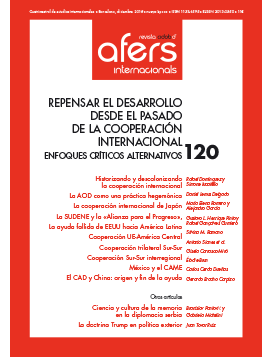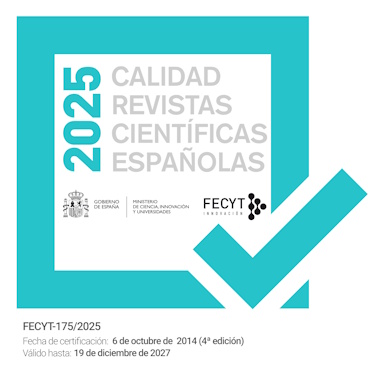Official development assistance (ODA) as a hegemonic practice (1945–2000)
Keywords:
Official Development Assistance (ODA), Development Assistance Committee (DAC), Gramsci, hegemonyAbstract
Revista CIDOB d’Afers Internacionals, nº 120
Quadrimestral (October-December 2018)
ISSN:1133-6595 | E-ISSN:2013-035X
DOI: doi.org/10.24241/rcai.2018.120.3.29
Official Development Assistance (ODA) has been paradigmatically constituted as an objective, universal and appropriate formula for countries to progress. But ODA is not neutral. This paper examines the evolution of ODA in the Development Assistance Committee (DAC) using the neo-Gramscian concept of hegemony. This perspective takes hegemony to be the articulation and justification of particular interests presented and accepted as general interests. Hegemony is therefore the conjunction of material power with the dissemination of an image of the world order and the presence of institutions that manage that order. This paper seeks to emphasise the need for theoretical reflection as a tool for demystifying ODA practices to allow an alternative model of development to be constructed.
>> The full text articles of this issue are available only in Spanish language
References
Acharya, Amitav y Seng Tan, See. «Introduction: The Normative Relevance of the Bandung Conference for Contemporary Asian and International Order». En: Acharya, Amitav y Seng Tan, See (eds.). Bandung Revisited: The Legacy of the 1955 Asian-African Conference for International Order. Singapur: National University of Singapore Press, 2008, p. 1-18.
Bandyopadhyay, Subhayu y Vermann, Katarina. «Donor Motives for Foreign Aid». Federal Reserve Bank of St. Louis Review, n.° 4 (2013), p. 327-336 (en línea) [Fecha de consulta: 13.03.2018] http://research.stlouisfed.org/publications/review/13/07/bandyopadhyay.pdf.
Bieler, Andreas y Morton, Adam David. «A critical theory route to hegemony, world order and historical change: neo-Gramscian perspectives in International Relations». Capital & Class, vol. 28, n.° 1 (2004), p. 85-113.
Bossuat, Gerard. «The Marshall Plan: History and Legacy». En: Eliot, Sorel y Pier, Carlo Padoan (eds.). The Marshall Plan: Lessons Learned for the 21st Century. París: OECD, 2008, p. 13-28.
Bracho, Gerardo. «La identidad de los países de renta media y de México desde la perspectiva de la OCDE». En: Ayala, Citlali y Pérez, Jorge (eds.). México y los países de renta media en la cooperación para el desarrollo: ¿hacia dónde vamos? México: Instituto Mora, 2009, p. 287-315.
Carothers, Thomas y Gramont, Diane. Development Aid Confronts Politics: The Almost Revolution. Washington, D.C.: Carnegie Endowment for International Peace, 2013.
Chandra, Siddharth. «Aid and Development. A Conceptual Perspective from Development» En: Piccard, Louis A.; Groelsema, Robert y Bus, Terry (eds.). Foreign Aid and Foreign Policy: lessons for the next half-century. Nueva York: M.E. Sharpe, 2015, p. 405-413.
Cini, Michelle. «From de Marshall Plan to EEC: Direct and Indirect Influences». En: Shchain, Martin (ed.). The Marshall Plan: Fifty Years After. Nueva York: Palgrave, 2001, p. 13-37.
Cox, Robert. «Social Forces, States and World Orders: Beyond International Relations Theory». Millenium: Journal of International Studies, vol. 10, n.° 2, (1981), p. 126-155.
Cox, Robert. «Gramsci, hegemony, and international relations: an essay in method». Millenium: Journal of International Studies, vol. 12 n.° 2, (1983), p.162-175.
Cox, Robert. «Multilateralism and World Order». Review of International Studies, vol. 18, n.° 2 (1992), p. 161-180.
Cox, Robert. The Political Economy of a Plural World: Critical reflections on Power, Morals and Civilisation. Londres: Routledge, 2002.
Cox, Robert. Universal Foreigner: the individual and the world. Singapore: World Scientific Publishing, 2013.
Cox, Robert y Sinclair, Timothy. Towards a posthegemonic conceptualization of world order: Reflections on the relevancy of Ibn Khaldun (1992). En: Cox, Robert y Sinclair, Timothy. Approaches to World Order. Cambridge: Cambridge University Press, 1996, p. 144-173 (en línea) [Fecha de consulta: 13.03.2018]. https://doi.org/10.1017/CBO9780511607905.009
Develtere, Patrick. How do we help: the free market of development aid. Lovaina: Leuven University Press, 2012.
Fee, Derek. How to Manage an Aid Exit Strategy. The Future of Development Aid. Londres: Zed Books, 2012.
Fontana, Benedetto. Hegemony and power: on the relation between Gramsci and Machiavelli. Minneapolis: University of Minnesota Press, 1993.
Fukuda-Parr, Sakiko. «Rescuing the Human Development Concept from the HDI: Reflections on a New Agenda». En: Fukuda-Parr, Sakiko y Kumar, A. K. Shiva (eds.). Readings in Human Development: Concepts, Measures and Policies for a Development Paradigm. Oxford: Oxford University Press, 2004, p. 117-124.
Goldin, Ian y Reinert, Kenneth. Globalization for development: trade, finance, aid, migration, and policy. Washington, D.C.: World Bank y Palgrave Macmillan, 2006.
Henig, Ruth. Versailles and After, 1919-1933. Londres: Taylor & Francis, 1995.
Herschinger, Eva. «Hell Is the other’: Conceptualizing Hegemony and Identity through Discourse Theory». Millennium: Journal of International Studies, vol. 41, n.° 1 (2012), p. 6-90.
Ives, Peter. Language and Hegemony in Gramsci. Londres: Pluto Press, 2004.
Jesse, Neal; Lobell, Steven; Press-Barnathan, Galia y Williams Kristen P. Beyond Great Powers and Hegemons: Why Secondary States Support, Follow, or Challenge. Palo Alto: Stanford Security Studies, 2012.
Keucheyan, Razmig. The Left Hemisphere: Mapping Critical Theory Today. Londres: Verso, 2014.
Lemus, Daniel. «Regímenes de verdad: el Comité de Ayuda al Desarrollo y la narrativa histórica de la Cooperación Internacional para el Desarrollo», en: Domínguez, Rafael y Rodríguez, Gustavo. Historia de la Cooperación Internacional desde una perspectiva crítica. Colombia: Universidad Autónoma del Caribe, 2017, p. 27-54.
Leysens, Anthony. The Critical Theory of Robert W. Cox. Fugitive or Guru? Nueva York: Palgrave McMillan, 2008.
Morton, Adam David. Unravelling Gramsci: Hegemony and Passive Revolution in the Global Political Economy. Londres: Pluto Press, 2007.
Naciones Unidas. «Declaración del Milenio». Naciones Unidas, (13 de septiembre de 2000) (en línea) [Fecha de consulta: 13.03.2018] http://www.un.org/spanish/milenio/ares552.pdf
Naciones Unidas. «Objetivos de desarrollo del milenio». Naciones Unidas, (2015) (en línea) [Fecha de consulta: 16.03.2018] http://www.onu.org.mx/objetivos_de_desarrollo_del_milenio.html
OECD-Organisation for Economic Co-operation and Development. DAC in Dates. The History of OECD’s Development Assistance Committee. París: OECD Publishing, 2006.
OECD-Organisation for Economic Co-operation and Development. Development Co-operation Report 2017: Data for Development. París: OECD Publishing, 2017.
OECD-Organisation for Economic Co-operation and Development. «Net ODA (indicator)». OECD, 2018 (en línea) [Fecha de consulta: 13.03.2018] http://dx.doi.org/10.1787/33346549-en
Pearson, Lester B. «El Desarrollo, empresa común. Una nueva estrategia». El Correo de la UNESCO, año 23, n.° 2 (1970), p. 4-24.
Riddell, Roger. Does Foreign Aid Really Work? Oxford: Oxford University Press, 2007.
Robb, Caroline. «Changing Power Relations in the History of Aid». En: Groves,
Leslie y Hinton, Rachel (eds.). Inclusive Aid: Changing Power and Relationships in International Development. London: Earthscan, 2004, p. 21-41
Santa Cruz, Arturo. «La Cooperación Internacional para el Desarrollo como norma internacional». En: Romero, Mariana Elena; Santa Cruz, Arturo; Uscanga, Carlos y Gildo, Gabriela. Sociedad Civil y Reforma en Japón: Un espacio para la acción. México: Japan Foundation y Universidad de Colima, 2007, p. 107-143.
World Bank. The Pearson Commission - July 2003 (English). World Bank Group Archives exhibit series; n.° 030. Washington, D.C.: World Bank Group, 2003 (en línea) [Fecha de consulta: 13.03.2018] http://documents.worldbank.org/curated/en/509101468185346260/The-Pearson-Commission-July-2003













